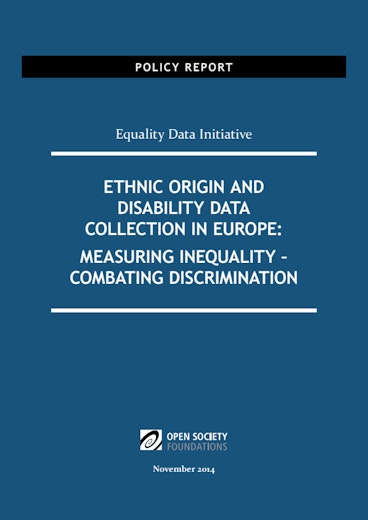No Equality without Data
By Costanza Hermanin & Angelina Atanasova

Data has long been a key component in efforts to promote equal treatment. The collection of data broken down by sex, for example, has been used to foster equality between men and women across Europe. In 2012, when data revealed that far fewer women held management positions than men, the European Commission took steps to correct gender balances in high-level positions of publicly traded companies. Data is also key to assess discrimination based on age—for instance, when analyzing recruitment practices of older (or younger) workers.
But when it comes to people with disabilites or racial and ethnic minorities, accurate data is not yet available that would allow policy makers to measure the extent of inequality in fields like employment or education. In fact, most member states of the European Union do not use data broken down by accurate categories of ethnic origin or disability in order to inform policies that aim to promote equality.
A new report from the Open Society Foundations titled Ethnic Origin and Disability Data Collection in Europe: Measuring Inequality—Combating Discrimination confirms that public authorities collect ethnic and disability data in one way or another in most of the seven countries under consideration—Bulgaria, France, Germany, Hungary, Ireland, Romania, and Sweden. However, governments collect such data through proxies for ethnicity or disability—like native language, family names, country of origin of (grand) parents, or health status—which might not be accurate or useful.
In most cases, individuals are not given the possibility to identify their own racial origin or disability. Rather, these characteristics are attributed by a third party—for instance, a statistician or a disability commission. This makes such data inaccurate and, in many cases, unreliable.
Take a black girl whose grandparents were born in Europe, or an individual with a speaking impairment that does not match established medical categories of disability. They are completely invisible to public statistics and, as a consequence, to policy makers.
Many European politicians base their refusal to break data down by categories of ethnicity and disability on the experience of historical persecution in Europe during World War II. However, our report suggests that many groups representative of ethnic or racial minorities and individuals with disabilities would like to become visible through data if this would allow authorities to create effective policies to correct inequalities in society. Many shared the frustration that the discrimination that exists in their everyday lives is not documented or measured in any systematic way.
Discussions and debates informed each stage of the research behind the report. We held national meetings in each of the seven countries with the participation of people with disabilities and from ethnic minorities. The output of these meetings feature in the final report of our project the Equality Data Initiative, alongside recommendations on how to improve data collection practices. There was a clear message from minority groups that no data should be collected about them without their input on the process.
The EU and international human rights institutions have limited powers to force governments to collect data that shows the position of minority groups in, for example, the education system or employment market. Change must come from the local and national levels. It is crucial to revive the debate on equality data collection and foster a shift in attitudes among authorities and the public on this issue.
The most important conclusion reached by this project is that the collection of safe, reliable, and inclusive data regarding ethnic origin and disability should be applied for the purposes of fighting discrimination and ensuring equality. Involving the affected communities in designing these processes can improve the way such data is collected and ensure that the way data is collected and used respects their right to privacy.
It is possible for equality data to be collected while still respecting binding core principles: self-identification; voluntary and anonymized data collection, provided with the consent of individuals who understand the purpose of data collection; community consultation throughout the process; and the option to choose multiple or intersecting identities (where individuals belong to more than one category such as ethnicity and disability).
The European Commission is well placed to influence national debates and set the adoption of these binding core principles as a precondition for any progress. For equality to be a reality in Europe, we need to make data count for everyone.
Until May 2016, Costanza Hermanin was a senior policy analyst for equality, justice, and home affairs.
Angelina Atanasova is a writer working with the Open Society European Policy Institute.


